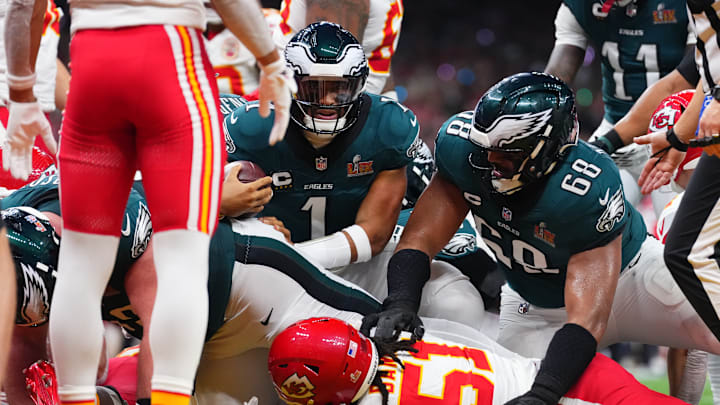The Philadelphia Eagles’ signature “Tush Push” remains a hot topic in the NFL, but team owner Jeffrey Lurie doesn’t see a good reason to ban it—at least not yet. With league officials set to revisit the issue in May, Lurie made it clear that unless there’s concrete evidence that the play is dangerous, it should remain part of the game.
“If this is proven to be less safe for the players, we will be against the Tush Push,” Lurie said at his annual press conference from the NFL Owners meetings in Palm Beach Florida. “But until that’s the case, to me, there’d be no reason to ban this play.”
There is no concrete evidence from the NFL that a single player was injured from the play and it's a point Lurie made very clear.
"I want to know what data there is. I don't think there is any. If you want to say that it could be, it's hard to make rules on could be's and should be's. The quarterback sneak is one of the reasons we like using the tush push, we think it's a safer play than the quarterback sneak. It's ironic that people would bring up health and safety. We're at the top of the game in terms of wanting health and safety on every play. We voted for hip drop tackle and defenseless receiver. We will always, always support what is safer for the players. It's a no-brainer. If this is proven to be less safe for the players, we will be against the tush push. But until that's the case, to me, there'd be no reason to ban this play."Jeffrey Lurie
The play, which relies on quarterback Jalen Hurts’ unique strength, as he can squat 600 pounds on top of the Eagles’ dominant offensive line, has been highly successful in short-yardage situations. It did not miss a beat after Eagles legendary center Jason Kelce retired. Cam Jurgens stepped in and the Eagles did not miss a beat on their way to their second Super Bowl title.
While some teams have struggled to replicate its effectiveness, some league executives argue that it creates an unfair advantage. Lurie strongly disagrees.
“It’s a play that’s available to every other team in the league,” he said. “And I think it hasn’t been used more than five times by almost every team in the league. Buffalo is an exception.”
Lurie did point at the Bills' objections without saying their name. This came after Bills head coach Sean McDermott, a former Eagles defensive coordinator, publicly voiced his displeasure with the play despite running a form of it with Josh Allen.
One of the main arguments against the play has been its appearance on the field, with Atlanta Falcons CEO Rich McKay even citing aesthetics as a reason for discussion. Lurie dismissed that reasoning entirely.
“Aestheticism is very subjective,” he said. “I’ve never judged whether a play looks okay. Does a screen pass look better than an in-route or an out-route? I don’t know.”
Lurie also emphasized that safety has always been the Eagles’ top priority and that the Tush Push was actually developed as a way to protect Hurts in short-yardage situations.
“One of the reasons we got motivated to develop an expertise in this play is it was more protective to the quarterback,” he said.
Lurie pointed out that the traditional quarterback sneak—which the Tush Push evolved from—poses more of a risk due to how quarterbacks are hit.
“The quarterback sneak, if you talk to quarterbacks about it, there’s more spearing going on,” he explained. “They’re less protected by players around them.”
Despite the success the Eagles have had with the play, Lurie acknowledged that offensive trends in the NFL change over time, and defenses eventually adjust.
"So I think for all of us that have followed NFL football over the decades, there’s an ebb and flow to offense and defense. And typically one of the great things about professional football is that defenses adjust to offenses and offenses adjust to defenses every year."Jeffrey Lurie
That’s one of the reasons he doesn’t believe the league should rush to ban the play. He pointed to past offensive trends, like the run-pass option (RPO), which was a major part of the Eagles’ Super Bowl-winning offense in 2017 but faded as defenses adjusted.
“When we won the Super Bowl a few years ago, we really banked on the RPOs and were very, very successful,” he said. “It didn’t take long for defenses to adapt to the RPOs, and if you notice, we weren’t as successful and we stopped using it nearly as much.”
Still, Lurie made it clear that whatever the league decides, the Eagles will be ready.
“If for any reason it does get banned, we will try to be the very best at short-yardage situations,” he said. “We’ve got a lot of ideas there.”
The NFL does have concerns about the play and that comes from the top.
"I think there are safety issues that are being considered. We have very little data from it, but it's beyond data," NFL Commissioner Roger Goodell said at his press conference today on potentially banning the Eagles Tush Push. "There's a lot of discussion about going back to the previous rule. I think that makes a lot of sense."
For now, though, Lurie and the Eagles are standing firm. Until there’s real evidence that the Tush Push is unsafe, they see no reason why it shouldn’t remain a part of the game.
